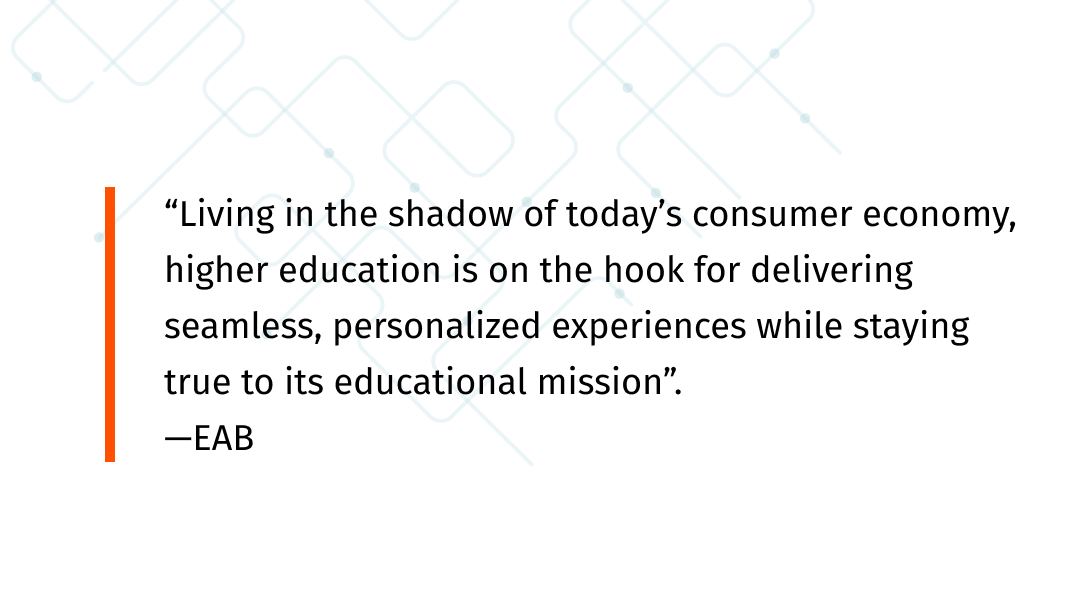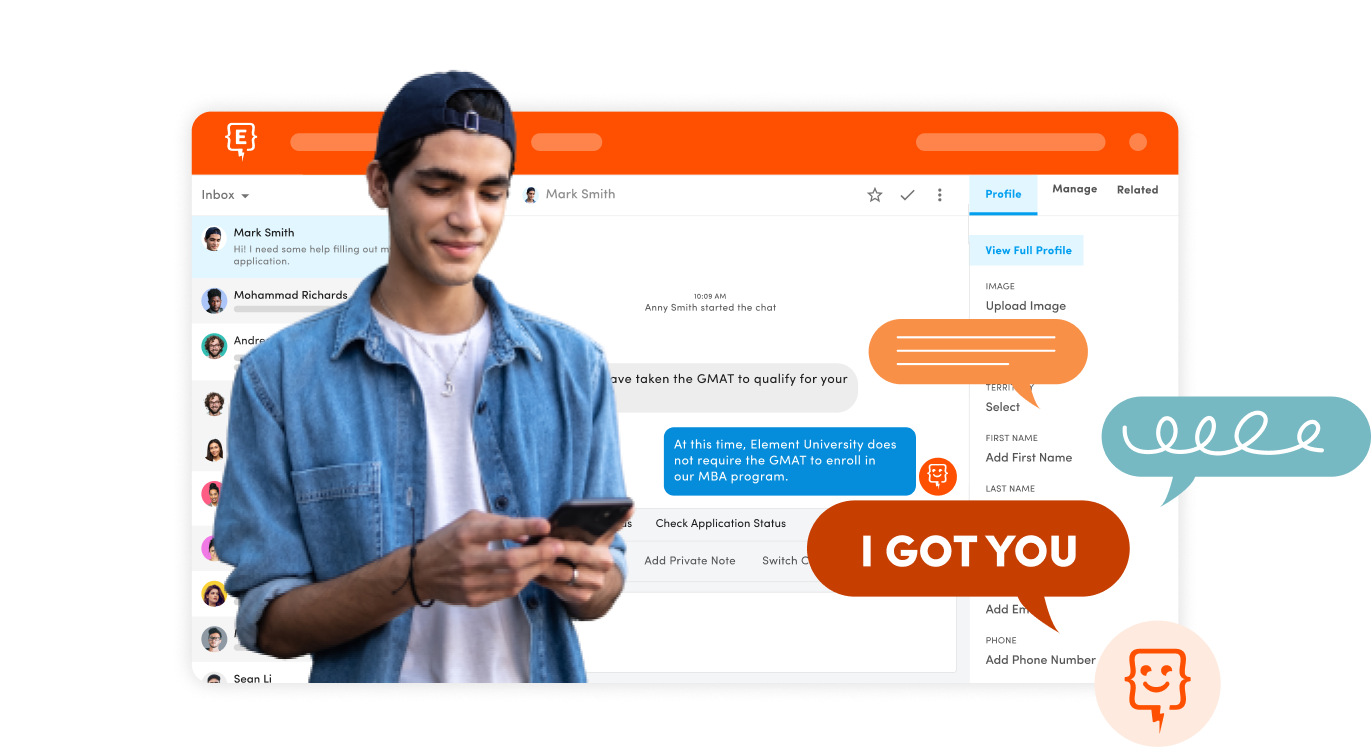
Table of Contents
Part 1: Introduction
Part 2: The Era of AI: Now and Tomorrow
Part 3: How AI is Transforming Higher Education
Part 4: The Future of Work


To understand how today’s students expect to be able to engage with colleges online, we only have to look at our own digital behaviors and expectations.
We learn about companies and products on our own, forming opinions based on what our peers (and complete strangers) say. We observe how organizations interact with customers on social media to decide if we can trust them.
When we’re ready to buy something or interact with a company we expect one-click routes and immediate feedback. Our shopping cart turns green. The ... starts moving in a chat box. We are assured that there’s someone on the other end tending to our needs.
Colleges and universities should treat students as customers. That doesn’t mean inflating grades or pandering to their every whim. What it means is anticipating their needs by really getting to know them as individuals, not as a member of a demographic group. It means being hyper responsive and clear when they have a question. It means using technology in ways that enhance learning and deepen connections.
Artificial intelligence makes the personalized attention students expect possible.
Admissions and Enrollment
There’s a reason college and financial aid counseling firms thrive: getting into and figuring out how to pay for college requires expertise. Unfortunately, it’s typically well-off families who can afford expensive guidance.
A more common scenario: middle and lower-income Americans who don’t have parents or close relatives who went to a four-year or community college. They lack the information and confidence to take on what seems daunting. They may not even be aware that a four-year degree isn’t their only option.
And filling out the FAFSA? That’s been notoriously challenging for years. And while well intentioned, the rollout of a streamlined version was filled with technical glitches and many frustrations. In fact, just 29% of polled families found the updated form easier to complete than the older version.
The complexity of getting into college is a huge barrier for schools looking to expand their pool of potential students.
Here’s another approach: give prospects an AI assistant and empower the 61% of all people ages 18-24 who were not enrolled in college in 2022. According to the Census Bureau's population estimates, that's about 19.1 million people.
The ingredients for an AI college counselor — for high school and adult students — are already available:
- Customer relationship management systems for collecting the data that gives students personalized direction. Traditional CRMs provide a 360-view of students at every stage — from suspect to alum. They store the basics we’d expect — name, intended major, events attended, standardized test scores, application materials, etc. A new generation of CRMs are intelligent and store every interaction a student has with a school’s digital (and even in-person) properties. For example, the pages they visit on the school’s site, the questions they ask a chatbot, every email they receive, and how much (or little) they engage with it. Some intelligent CRMs can even “stitch” past interactions to a student’s current record. This is especially useful for understanding what content stealth applicants engage with before applying.
- Intelligent CRMs are smart enough to predict what type of message (the channel and content) will move a student to the next step. This information is based on millions of micro-interactions from other students’ journeys. It removes the gut instincts and anecdotal evidence that still drive so much of admissions and enrollment communication plans.
- AI chatbots trained on a school’s knowledge base (similar to an institutional Wikipedia) or standalone documents can provide natural-language responses to prospects’ questions. They can handle hundreds or more conversations at a time and provide factually identical responses. That means a human advisor or a prospect doesn’t need to wade through web page after web page to find out the deadline for a specific application type with low confidence that it’s correct.
- Generative AI can write personalized emails, web pages, text messages, and other types of content for each individual based on things like what documents they need to submit or an upcoming event related to their academic interests. That level of personalization — substantially more compared to the dozen or so traditional audience segments marketing departments usually work with — is impossible with only human writers and designers. And if you’re worried about human writers (like the one writing this), don’t be. They will be writing the prompts the AI follows (also known as prompt engineering), working more like an editor with an unlimited team of writers who already know the subject matter and how to adapt their tone and style for a particular assignment.
- Generative AI search combines generative AI with search technology. Take for example a typical search on a college website. The results lack context and require students to click through each item to see if it contains what they’re looking for. Generative search revolutionizes this experience by analyzing search terms and browsing history to deliver tailored results, making information discovery more efficient and relevant. For instance, a high school senior searching for "computer science" on a school’s site might receive a text summary of information about engineering degrees, financial aid, and related student clubs. The system acts as a smart assistant, providing context-rich results that aid in decision-making. It simplifies complex queries, allowing students to ask natural questions like "What are the best scholarships for business students?" and receive clear, concise answers with relevant resource links.
Fast Facts
42%
of consumers show high interest in using chatbots to receive detailed and accurate responses, highlighting the growing demand for AI-driven customer interactions.
PwC
90%
of companies report that chatbots are highly effective at handling customer service requests, streamlining support while enhancing customer satisfaction.
Hubspot

The AI Advisor for Full Lifecycle Relationship Management
Too often, the admissions and enrollment courting abruptly ends when the semester starts. As welcoming as they may be, the many departments a new student is introduced to is overwhelming.
What if we reimagined how we introduce and onboard students to their new communities?
- Your school is here for you. Student services, the registrar, the bursar (a name most students have never encountered before and never will again), the list is long, and who does what is a mystery. With an intelligent CRM these departments come together to provide a holistic experience. Who does what is less important than getting things done.
- We’re excited to know you even more. By the time a student has gone through the admissions and enrollment process, intelligent CRMs have amassed considerable information about the student. For example, the time of day they’re most likely to open a message and the type of content that makes them take action. So instead of a re-welcome, it’s a continuation of the relationship the school and student are in already.
- Let’s guide you. With a full lifecycle AI advisor, a student receives a message (optimized for the channel and style the AI knows they prefer) with an interactive list of tasks they need to complete before classes start. The links take them to the right place, and an AI chatbot is at the ready to answer questions.
- Smarter and smarter. Intelligent CRMs get better over time. What’s the optimal number of days before a deadline to start nudging a student to register, for example? Is a text encouraging a student to meet with their in-person academic advisor more effective than an email? What if the AI makes appointments for the student? The AI gathers more and more intelligence as it engages with students.
The beauty of the AI-powered CRM is that it can achieve a level of personalization and customization that the smartest, hardest working team never could.

